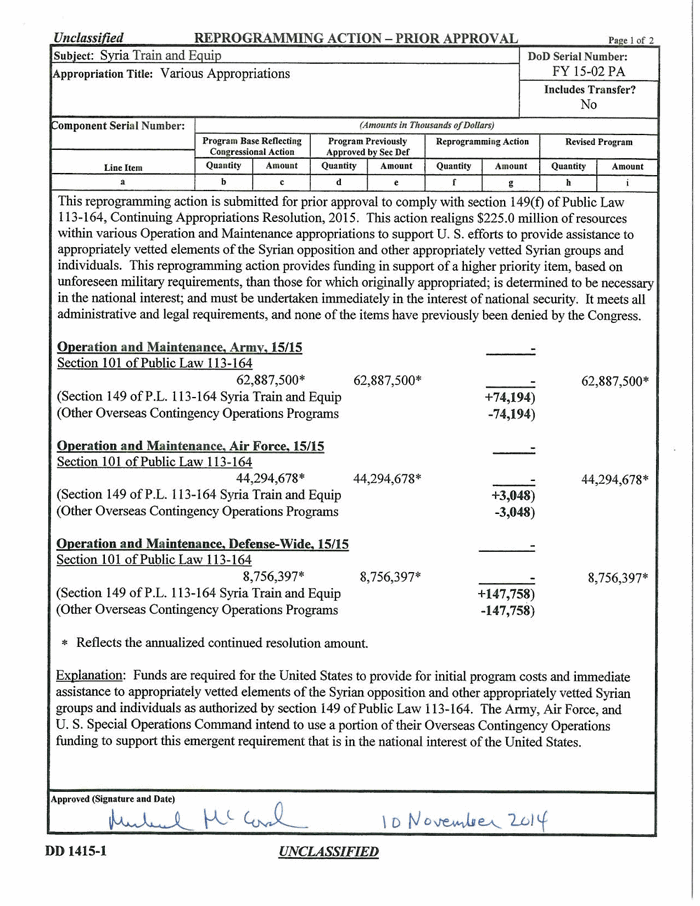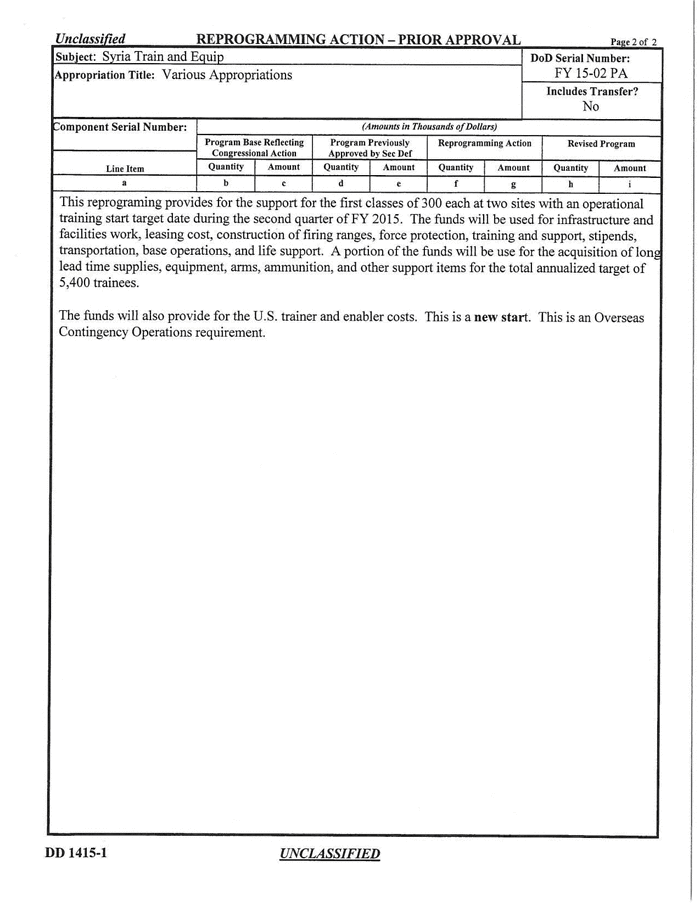Pentagon has shared with Congress new details about its plan to train and equip vetted members of the Syrian opposition to fight the Islamic State in hopes of finally securing funding for the effort.

With an initial tranche of $225 million, the Defense Department aims to train the first classes of Syrian rebels, each of which will have 300 fighters, according to a reprogramming request signed by the Pentagon's chief financial officer, Mike McCord.
The document, dated Nov. 10, was sent to Capitol Hill last week. It represents the final hoop the Pentagon must jump through before it can start using the money the way it wants. Because Congress has already granted the Defense Department authority to launch a "train-and-equip" program for Syrian rebels, the four congressional defense committees are expected to approve this latest request before adjourning in December.
The Pentagon aims to begin training in the second quarter of fiscal year 2015, meaning anytime between January and March. The plan calls for moving a total of 5,400 trainees through two sites, the document states, without mentioning where the training will happen. However, both Saudi Arabia and Turkey have offered to host training.
"The funds will be used for infrastructure and facilities work, leasing cost, construction of firing ranges, force protection, training and support, stipends, transportation, base operations, and life support," according to the reprogramming document, a copy of which was obtained by Foreign Policy.
Lawmakers have criticized Barack Obama's administration for not ramping up the training-and-arming program faster
Instead, Congress asked the Pentagon to send what's called a reprogramming request -- used whenever the Defense Department wants to shift large amounts of money from lower-priority programs to higher-priority ones -- to outline the training plan.
For McCord, this is just one example of how the Pentagon's ability to respond to rapidly developing crises is hampered by a legislative and budget-planning system that isn't designed to move quickly.
"These things take a while -- and ISIL doesn't wait on us," he said, using one of the Islamic State's acronyms.
Neither does Ebola.
As death rates in Western Africa climbed higher and higher in early September, aid groups working there made a rare call for global military intervention. Soon after, the Pentagon said it would send a 25-bed hospital to Monrovia, Liberia's capital. That initial offer seemed paltry given the scale of the epidemic and the massive need for help in the hardest-hit countries.
But the Defense Department was also busy crafting much bigger response plans. McCord's office was charged with figuring out how much it would cost and how to pay for it. There is a big difference between Ebola and other humanitarian disasters, McCord said. With something like an earthquake or hurricane, there is an early understanding of the extent of the destruction and the numbers of lives lost. With that information, the U.S. military can plan its contribution to the relief effort.
"With Ebola, the problem continues to spread and evolve at rates you can't predict," which requires flexible budgeting, McCord said.
Reprogramming requests are one way the Pentagon can respond to unforeseen conflicts or disasters. These were used in new, and some would say innovative, ways this summer, and they reflected the uncertainty about how big these crises were going to get.
For example, in one such request, the Pentagon asked to reassign $500 million to help fight Ebola and respond to the humanitarian crisis in Iraq caused by the Islamic State. However, it did not delineate amounts, meaning the U.S. military technically could spend $1 on Ebola and $499,999,999 on Iraq -- or vice versa.
"We were trying to build in hedges for things that were not precisely defined," McCord explained. "We're trying to use all of the flexibility that we do have in the system. The world moves so fast right now, and our system was not built to move fast, and it's really in conflict with how the world works."
In total, the Pentagon eventually asked to shift $1 billion to counter Ebola in Liberia.
"We've never put that kind of money into our humanitarian assistance account," McCord said.
The Pentagon's normal spending on disasters around the world is roughly $100 million a year, he said: "[Ebola] would have eaten our whole budget for the year in a month." Therefore, he was not surprised that Congress had lots of questions.
"We were, I think it's fair to say, pushing the envelope in terms of a lot of big reprogrammings," McCord said, adding that there was also a hefty classified request associated with the operations against the Islamic State.
Timing also made McCord's job harder. Late in any fiscal year, which ends Sept. 30, few dollars are left to move around. Also, the United States was ramping up two huge efforts -- fighting Ebola and terrorists in Iraq and Syria -- well after the Pentagon finished its budgeting for fiscal year 2015, which started Oct. 1, forcing McCord and his staff to amend the plan already sent to Capitol Hill.
Included in the $5 billion request for fighting the Islamic State is $1.6 billion for a new train-and-equip program for 12 brigades of Iraqi security forces and Kurdish Peshmerga. On Nov. 7, the Pentagon said it is sending another 1,500 troops to Iraq. Of them, 870 will be assigned to the training mission at sites in northern, western, and southern Iraq.
Although the Pentagon has deployment authority, once in Iraq, the troops cannot conduct the training mission without specific approval from Congress. That's because the training of foreign militaries -- or in the case of Syria, foreign rebel groups -- requires Congress to sign off on the plans and the funding.
"We have almost no authority to conduct that train-and-equipping operation until Congress approves something that gives the authority to do so," McCord said. "There are little things that we can do, but nothing like the kind of scope that we think that we need to do."
Now the issue is all wrapped up in the messy end-of-year budget battle playing out on Capitol Hill with a lame-duck Congress.
In September, lawmakers passed a temporary spending measure to avoid a government shutdown. Included in that legislation was legal authority for the Pentagon to start the program for Syrian rebels, but not the money for it.
The short-term spending measure -- called a continuing resolution (CR) -- expires on Dec. 11, as does that legal authority. To keep the government running, Congress will need to pass an omnibus spending bill for 2015, or at the very least extend the CR into January.
If Congress extends the CR, McCord said he thinks the authority to train and equip the Syrian rebels would extend with it. But the Pentagon still wouldn't have the authority it needs to launch a handful of other high-priority endeavors, including the Iraqi train-and-equip program, he said.
The Pentagon is also waiting for congressional authority to launch a $1 billion European Reassurance Initiative and a new $5 billion fund to fight terrorism, including $500 million to train Syrian rebels.
"You could argue that those can wait, but I would argue they shouldn't," he said. "Around the world, whether it's in Europe or the Middle East or in Africa, I think there's real good we could be doing with these authorities," McCord said.
That doesn't mean the training programs will be up and running the day after Congress signs off, he said. "But the longer we wait, we can't do anything other than planning."
Photo by STAFF/AFP/Getty Images


Δεν υπάρχουν σχόλια:
Δημοσίευση σχολίου